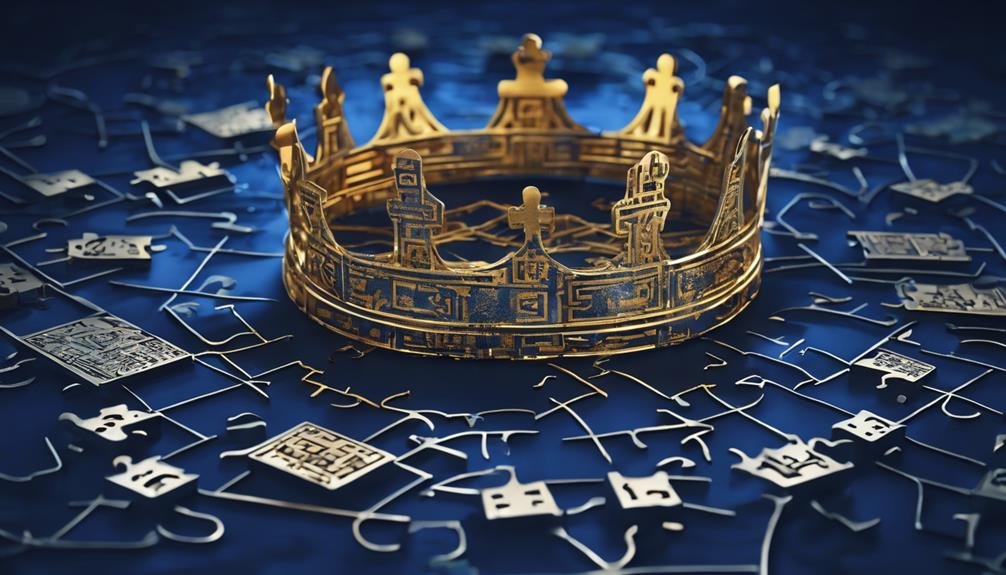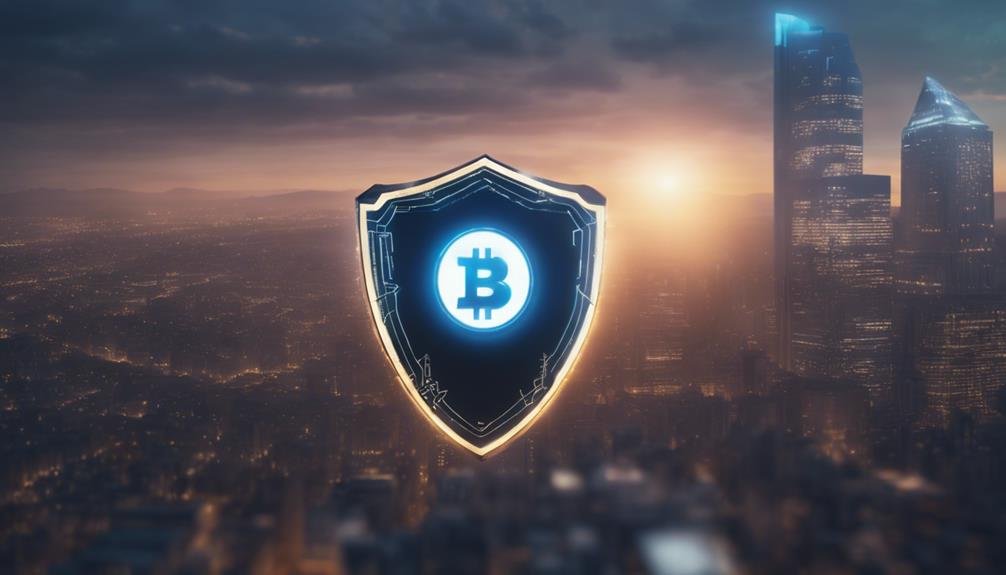NFT creators possess inherent legal rights that shape the digital landscape, including the authority to determine licensing terms, allocate royalties, and control NFT transfer, all essential for protecting intellectual property rights. These rights allow creators to navigate copyright laws, allocate royalties, and guarantee the secure transfer of digital assets. Effective succession planning and management of digital assets are also necessary.
Furthermore, understanding intellectual property rights, compliance with securities laws, and measures to prevent infringement and cyber risks are crucial for NFT creators. By grasping these legal rights, creators can access the full potential of their digital creations and safeguard their intellectual property for the future.
Table of Contents
Brief Overview of Legal Rights of NFT Creators
- NFT creators can determine licensing terms, allocate royalties, and control NFT transfer through smart contracts.
- Ownership of an NFT does not automatically grant intellectual property rights, which must be licensed separately.
- Creators must navigate copyright laws to safeguard their assets and consider options for intellectual property transfer.
- To ensure NFT integrity, NFT creators must comply with securities laws, anti-money laundering regulations, and cybersecurity risks.
- Registering NFTs and associated copyrights strengthens legal protections against infringement and unauthorized copying.
NFT Creators’ Legal Rights
At the core of the rapidly evolving NFT landscape, creators’ legal rights serve as a pivotal foundation, empowering them to exert control over their digital assets and dictate the terms of their use. NFT creators have the authority to determine licensing terms embedded in smart contracts, which enables them to allocate royalties and control the transfer of their NFTs. This level of control allows creators to protect their digital assets from infringement and maintain their intellectual property rights.
However, it is essential to note that owning an NFT does not automatically grant intellectual property rights to the creator. Creators must navigate copyright laws to safeguard their digital assets and guarantee infringement protection. The legal frameworks surrounding NFTs are evolving, emphasizing the importance of understanding and protecting creators’ rights. By grasping these legal rights, NFT creators can effectively manage their digital assets, ensuring they retain control and reap the benefits of their creations.
Copyright and Intellectual Property
In digital ownership, copyright and intellectual property considerations play a pivotal role in safeguarding NFT creators’ rights as they navigate the complex landscape of ownership and control. When minting digital assets, NFT creators must consider copyright laws to avoid infringement. Smart contracts can be used to transfer intellectual property rights with NFTs, providing a secure and transparent way to manage ownership.
Here are vital considerations for NFT creators:
- Ownership does not grant intellectual property rights: Possessing an NFT does not automatically grant ownership of the underlying intellectual property.
- Licensing options are available: Creators can choose from various licensing options to specify usage rights, ensuring control over their digital assets.
- NFT platforms must prevent infringement: Platforms should implement mechanisms to avoid copyright infringement, protect creators’ rights, and maintain a trusted environment.
- Smart contracts can facilitate IP transfer: By utilizing smart contracts, NFT creators can efficiently transfer intellectual property rights, streamlining the process and reducing potential disputes.
Ownership and Succession Planning

Blockchain-based ownership of NFTs raises critical questions about the long-term management and transfer of these unique digital assets, particularly in the event of an owner’s passing. As NFT creators consider their legal rights, succession planning is essential to guarantee the secure transfer of their digital tokens. This involves detailing executor transfer instructions, which can be complex due to the unique passphrases often associated with NFTs.
In the event of an owner’s passing, NFT collections may undergo probate to determine rightful inheritors, highlighting the importance of careful digital asset management and transfer protocols. Creators must consider their intellectual property rights and legal obligations when developing a succession plan, guaranteeing that their NFTs are transferred according to their wishes. By prioritizing succession planning, NFT creators can safeguard their ownership and legacy, providing clarity and confidence for themselves and their beneficiaries.
By understanding the intricacies of NFT ownership and succession planning, creators can navigate the legal landscape and secure their digital assets for future generations.
Navigating Legal and Regulatory Issues
The rapidly evolving legal and regulatory landscape surrounding non-fungible tokens (NFTs) requires creators to be vigilant in maneuvering through complex challenges, from copyright and ownership disputes to securities laws and anti-money laundering regulations. As NFT creators navigate this complex terrain, they must guarantee compliance with various rules and regulations to avoid legal issues.
To mitigate these risks, NFT creators should consider the following key factors:
- Intellectual property rights: Understanding copyright and ownership rights is essential to protect NFTs from infringement and unauthorized use.
- Compliance with securities laws and anti-money laundering regulations: NFT creators must guarantee that their NFT transactions comply with relevant laws and regulations to avoid legal and financial repercussions.
- Ownership and authenticity: Verifying the ownership and authenticity of NFTs is vital to maintaining trust and confidence in the NFT marketplaces.
- Blockchain technology and cybersecurity: NFT creators should be aware of the potential risks and benefits associated with blockchain technology and take necessary measures to guarantee the security and integrity of their NFTs.
Protecting NFTS From Infringement

Creators of non-fungible tokens must prioritize copyright protection to safeguard their digital assets from unauthorized duplication and exploitation. NFT creators are entitled to legal protections against infringement as intellectual property rights holders. However, copyright infringement risks arise when unauthorized copies of NFTs are minted or sold, compromising the creator’s exclusive rights. To mitigate this risk, creators can take legal action against parties infringing on their NFT copyrights. Registering NFTs and associated copyrights can strengthen legal protections against infringement, providing a public record of ownership.
Additionally, monitoring NFT marketplaces and platforms for unauthorized use of NFTs is not just essential; it’s empowering. It’s a proactive step that can prevent infringement and protect your digital assets. Creators must remain vigilant in enforcing their copyright laws, as failure to do so can lead to the devaluation of their digital assets. By understanding their legal rights and taking proactive measures, NFT creators can protect their intellectual property effectively and maintain control over their unique digital creations.
Frequently Asked Questions
What Rights Do NFT Owners Have?
NFT owners have limited rights, primarily centered around ownership and resale. They can prove authenticity claims through blockchain technology, but ownership does not automatically grant entire intellectual property or usage rights. Licensing agreements and contractual obligations can further restrict rights, while smart contracts may specify royalties and monetization opportunities. However, legal disputes can arise if these terms need to be clarified, highlighting the need for creators to establish clear contractual obligations.
What Is the Law on Non-Fungible Tokens?
Imagine a digital canvas where art and code converge. The law on non-fungible tokens (NFTs) is a complex tapestry woven from threads of creator protection, ownership rights, and licensing agreements. Intellectual property laws apply, ensuring art authenticity. NFT regulations vary, but smart contracts facilitate secure token transfers, solidifying digital assets. The tokenization process raises questions, but clarity is emerging. As the legal landscape evolves, understanding these intricacies is essential for exploring the world of NFTs.
What Are the Author Rights of NFT?
Author rights of NFT creators encompass exclusive control over their digital assets, ensuring intellectual property protection. Creators retain ownership rights, allowing them to license their NFTs through agreements that dictate terms of use. Additionally, they possess resale rights, enabling them to benefit from secondary market sales. The tokenization process also grants creators fair use protection, safeguarding their work from unauthorized reproduction.
How Does Copyright Work With NFT?
Regarding NFTs, copyright protection is essential to securing ownership rights over digital assets. Creators must understand that copyright laws grant them exclusive intellectual property rights over their artistic creations, including tokenized art. However, fair use provisions and licensing agreements can affect the extent of these rights. On blockchain technology, smart contracts can outline specific terms. Still, creators must know the potential legal implications to safeguard their work.
Conclusion
As the digital landscape evolves, NFT creators must navigate the complex legal terrain to protect their innovative works. Like master artisans, they must carefully construct their intellectual property fortresses, ensuring that their creative genius is safeguarded from infringement and misappropriation. By understanding their legal rights, NFT creators can confidently access the full potential of their digital masterpieces, securing their place in the annals of artistic and cultural history.




